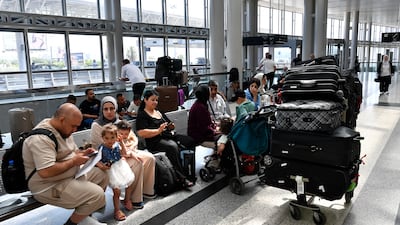The scenes outside Iraqi Airways offices in several countries have become all too familiar: angry travellers desperate to return home, shouting at employees, families waiting for hours and some even sleeping outside in hopes of securing a ticket.
The air war between Israel and Iran has led to widespread airspace closures in several Middle East countries, including Iraq, as missiles soar across the sky. It has forced the cancellation and delay of hundreds of flights at airports, leaving thousands of travellers stranded abroad.
“The situation is absolutely ridiculous,” Iraqi citizen Mujtaba told The National as he stood outside an Iraqi Airways office in Beirut late on Wednesday. "It's all a farce."
Along with two friends, Mujtaba, 26, left for Beirut in early June for the Eid Al Adha holiday. They were supposed to return on Monday.
“I have been here for four days now going back and forth,” he said. “They are cheating us, there are families who ran out of money and others do not have anything to eat,” he added.
Pressure to act
Under mounting pressure to act, the Iraqi government is allowing flights in and out of the country only through Basra International Airport in the south. It has urged its citizens to arrange flights to any neighbouring countries, or to cross to Iraq by land. Authorities have also convinced Turkey, Jordan and Kuwait to ease visa regulations for Iraqis, so they can receive the documents on arrival and be able to cross borders.
“There are thousands of travellers we can’t cope with,” an official with Iraqi Airways told The National. “In some cases we need the government to reach agreements with states in order to allow us to use their airspace, or to land in their airports – that’s why there are delays in getting them back."
The Iraqi government on Saturday began arranging trips over land for Iraqi Hajj pilgrims returning from Saudi Arabia. Iranian pilgrims were also taken home overland through Iraq.
Many travellers have alleged that Iraqi Airways employees were taking advantage of the situation, demanding exorbitant prices for tickets. “They asked us to pay about $850 only to secure a seat,” Mujtaba said.
The Iraqi Airways official said they were investigating such claims.

Another traveller in Dubai, who requested anonymity, waited for three days to get his ticket. “It was chaos over the past days, but thanks to the Iraqi consular and the embassy employees who oversaw the process today, they carefully checked the lists and co-ordinated with Baghdad on numbers and names," he said.
Many Iraqis have turned to public Facebook groups in search of guidance on how to reach neighbouring countries by land. Some offered guidance on the best ways to send money to stranded families.
The situation is further complicated by increased transport fees on land, making it difficult for those who managed to return by land to afford transport. The price of a seat in a taxi and SUV from Amman to Baghdad has jumped from $50 to between $250 and $300.
Israel last Friday launched its largest ever attack on military and nuclear sites in Iran, killing senior commanders in the country's Islamic Revolutionary Guard Corps, as well as nuclear scientists, and damaging atomic sites such as Natanz and Isfahan. Israel described the operation as necessary to prevent Tehran from moving closer to acquiring a nuclear weapon.
At least 585 people, including 239 civilians, have been killed and more than 1,300 wounded in Iraq since the outbreak of the confrontation, according to an Iranian human rights group in Washington.
Iran has fired hundreds of missiles and drones in retaliatory strikes that have killed dozens of people in Israel and wounded hundreds more. Some have hit apartment buildings in central Israel, causing heavy damage, and air-raid sirens have repeatedly forced Israelis to run for shelter.


